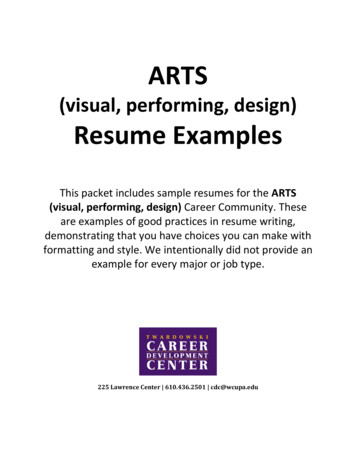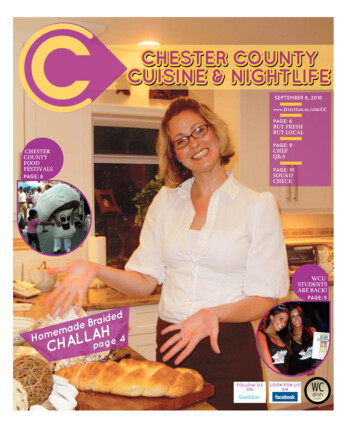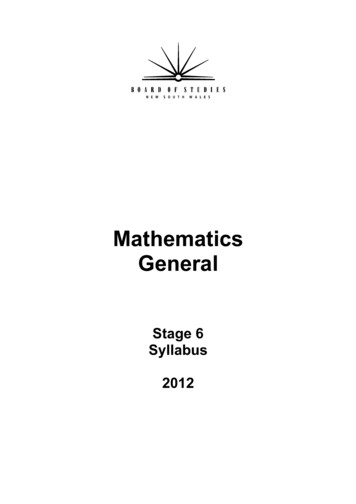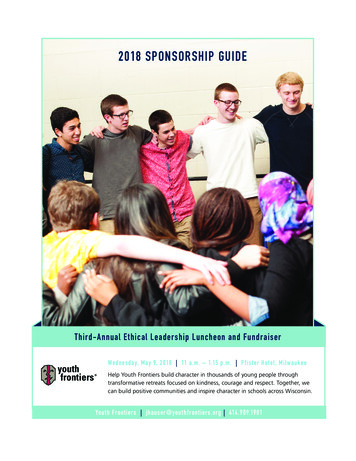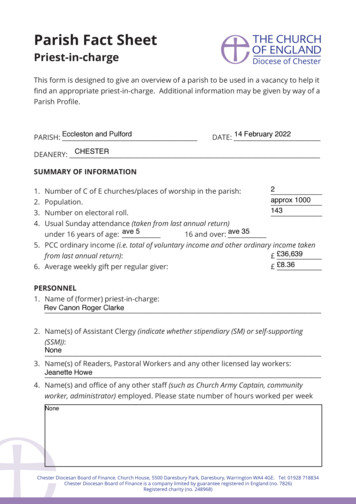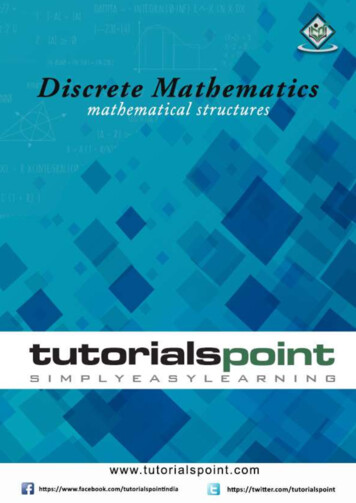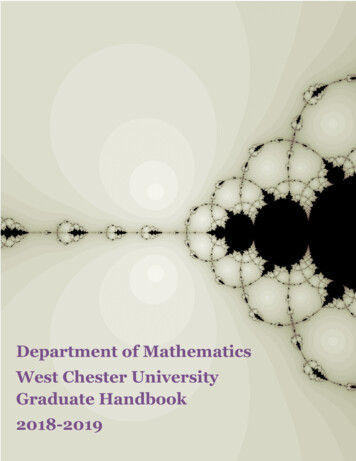
Transcription
Department of MathematicsWest Chester UniversityGraduate Handbook2018-2019
If you have any questions about any item in the Handbook or if you wish to learn more aboutour graduate programs or the Department of Mathematics at West Chester University, pleasedo not hesitate to contact us.Peter L. Glidden, Ph.D., Columbia UniversityProfessor and ChairUNA 101, pglidden@wcupa.edu610-436-2440Gail Gallitano, Ed. D., Columbia UniversityUNA 114, ggallitano@wcupa.eduProfessor and Coordinator of the MA Mathematics Program610-436-2452Mark McKibben, Ph.D., Ohio UniversityUNA 113, mmckibben@wcupa.eduProfessor and Coordinator of the MS Applied and Computational610-436-2148Mathematics ProgramRandall Rieger, Ph.D., University of North CarolinaUNA 116, rrieger@wcupa.eduProfessor and Coordinator of the MS Applied Statistics Program610-436-2893Department of Mathematics25 University AvenueWest Chester UniversityFax: 610.738.0578Cover art courtesy of Dr. Andreas AristotelousThe cover is an example of Newton fractal generated by plotting the starting points of aNewton's iteration applied to a complex valued function. The fractal geometry is created bythose starting points that the iteration failed to converge to a root. Coloring here representsthe iteration number where the formula found the root within a given tolerance. The fixedpoint iteration used here is z g(z) z-1/(0.5/(z-1) 1/(z 0.5 - 0.866i) 1/(z 0.5 0.866i)
TABLE OF CONTENTSPageMathematics at West Chester University1Degree Programs2MA Mathematics4MS Applied and Computational Mathematics14MS Applied Statistics21Descriptions of Graduate Courses28Faculty and Staff38
Mathematics at West Chester UniversityMissionThe Department’s mission statement includes the following goals: To give students a firm grounding in the ideas and methods of mathematics.To develop an understanding and appreciation of the abstract and deductive natureof mathematics.To give students an appreciation of the contemporary as well as the historicalimportance of mathematics.To provide students with sufficient skills to enable them to apply their knowledge torelated fields of study.To prepare students for continued study in graduate school, a career as a middle orsecondary school teacher of mathematics, or for a career as an actuary, as an appliedmathematician or such as a statistician, or an industrial mathematician.Mathematics ColloquiaAlmost every Wednesday afternoon, the Department of Mathematics hosts a talk on animportant topic in mathematics or mathematics education. The talks are presented by ourfaculty, visiting faculty members, well known lecturers in mathematics education, formerstudents, and sometimes even current upper-class undergraduate or graduate students.Quality TeachingGraduate students receive individual attention from our faculty members. We like to thinkof ourselves as being a friendly, warm, and student-centered department.Social ActivitiesThere are frequent opportunities for faculty members and students to socialize. Both areinvited to attend the Wednesday afternoon Teas, the Annual Thanksgiving Dinner, and theAnnual Awards Banquet as well other events sponsored by individual faculty members andstudent organizations.Technical and Related SupportStudents have access to microcomputer networks at numerous locations. These have fullinternet access. A current collection of mathematical, statistical and programmingsoftware is available for student use including Mathematica, Maple, MATLAB, MiniTab, andSAS. Computational Mathematics Laboratories are located in rooms 103 & 109 next to theStudent Tutorial Center. Desktop computers and a large and current software library areavailable in the Student Tutorial Center. The Department also has a Seminar Room (room103) that includes a small mathematics library.1
Degree ProgramsThe Department of Mathematics offers three graduate degrees: MA Mathematics. The MA in Mathematics Program is a thirty-three credit Master’sProgram designed to offer candidates flexibility through elective courses. The corecurriculum is eighteen mathematics courses consisting of abstract algebra, realanalysis, mathematical statistics, and geometry. Students in this program havefifteen credits of electives, which they may carefully select to prepare themselves fora wide variety of job opportunities. The student’s capstone experience is either athesis or an oral comprehensive exam. A thesis is recommended, if a student wouldlike to pursue a doctoral degree in mathematics or a related field, or be employed asa research mathematician. A graduate degree in mathematics is a much sought-afterdegree by many employers because mathematics teaches discipline and greatproblem-solving skills. Through selection of elective courses students may preparefor a wide variety of jobs in many areas with possible employment in colleges,universities, and many state, federal and private agencies. The program is also wellsuited for high school mathematics teachers or educators who are interested incollege teaching. Students may elect up to four mathematics education courses. Forfurther information, please contact Dr. Gail Gallitano, Program Coordinator. MA Mathematics – the Mathematics Education Track. The MA in Mathematicswith the Mathematics Education Track is a thirty three-credit Master’s Programwhich is designed to offer candidates flexibility through their elective courseselection so they may select mathematics education electives. The core curriculumis eighteen solid mathematics courses which consist of abstract algebra, realanalysis, mathematical statistics and geometry. Students in this program havefifteen credits of electives and they may select up to four mathematics educationelectives which is twelve credits and then an additional three credit elective in anyarea of mathematics or related field. This will help prepare them for a wide varietyof job opportunities in the field teaching and/or mathematics education. Thestudent’s capstone experience is either a thesis or an oral comprehensive exam. Athesis is recommended if a student would like to pursue a doctoral program inmathematics education or related field. For further information, please contact Dr.Gail Gallitano, Program Coordinator. MS in Applied and Computational Mathematics. The Master of Science in Appliedand Computational Mathematics Program is designed to provide students withtraining essential to launching a career as an industrial mathematician and toprovide a course of study that would facilitate doctoral study in applied orcomputational mathematics or further graduate study in a computationallyintensive cognate area. The project-driven curriculum equips students with anadvanced body of knowledge in content areas that span the realm of appliedmathematics, including differential equations, discrete mathematics, probabilisticmodeling, optimization, and statistical analysis. The development, refinement,analysis, and validation of mathematical models of real-world phenomena extractedfrom actual industrial settings is front and center in all courses. Dual emphasis is2
placed on computational mathematics in the study of all real-world projects in eachcourse of the curriculum. Semester-long team-oriented projects culminating informal technical reports and oral presentations are required in each course. Forfurther information, please contact Dr. Mark McKibben, Program Coordinator. MS in Applied Statistics. The MS in Applied Statistics is a state-of-the art programthat brings together statistical theory, computer programming, and scientificresearch. This degree prepares you for immediate employment in a variety of highpaying industry positions as well as for doctoral study in applied statistics or arelated field. Starting in Fall of 2018, students will be able to get their Master’sdegree in Applied Statistics with a concentration in either Biostatistics or Businessand Marketing Analytics. Students will also still have the option to get the moregeneral Master’s in Applied Statistics without a concentration. Our Master’s degreein Applied Statistics with a concentration in Biostatistics will prepare students forcareers in medical research, pharmaceutical statistics, and bioinformatics. OurMaster’s degree in Applied Statistics with a concentration in Business and MarketingAnalytics will prepare students for careers in business, banking, risk management,and marketing analytics. Students may select a concentration at the time ofapplication to the Program. They will have the option of changing concentrations (ormoving to the general degree) at any time while enrolled in the Program. For furtherinformation, please contact Dr. Randy Rieger, Program Coordinator.3
MA MathematicsThe MA in Mathematics at West Chester University is a thirty-three credit Master’sProgram which offers great flexibility. Students take eighteen credits of core curriculumcourses and fifteen credits of electives which they choose in conjunction with their advisor.The core curriculum includes a broad selection of mathematics courses including abstractalgebra, real analysis, mathematical statistics, and geometry. Students may select from awide range of specialized electives. Elective courses may be in mathematics education,statistics, computer science, pure mathematics, applied and computational mathematics,actuarial science, and others. For their capstone experience, a student may choose betweena thesis and an oral comprehensive exam.By properly selecting their electives, our MA candidates may train for work in a largevariety of fields, including, but not limited to, actuarial science, computer science,operations research, biomathematics, cryptography, teaching in a high school or a twoyear/four-year college, research, economics, environmental mathematics, geophysicalmathematics, air traffic control operations, photogrammetry, and many more. Fiveexcellent jobs namely, software engineer, actuary, computer systems analyst, computerprogrammer, and mathematician all require a strong background in mathematics. Uponcompletion of the MA in Mathematics students are also well prepared to pursue a doctoraldegree in mathematics.Mathematics opens the doors to many promising careers and teaches patience, discipline,and systematic problem-solving skills. In addition, most high-earning college degrees allhave a common element namely mathematics. Not only do many professions and majors(engineering, doctors, physics, nurses, computer science, actuarial science, etc.) requirecourses in mathematics, but the analytical and problem-solving skills students learn inmathematics can apply to all disciplines. There are an unlimited number of jobopportunities for our graduates with an MA in Mathematics.Many public and private employers hire in the field of mathematics. These include schools,colleges, universities, and many state and federal agencies. Some specific employersinclude the Internal Revenue Service, U. S. Census Bureau, Ford Motor Co., TransamericaInsurance Co., Jet Propulsion Laboratory, IBM Corporation, Center for CommunicationsResearch, A. C. Nielsen Co., American Airlines, U. S. Department of Energy, ExxonProduction Research Co., United Airlines, Bureau of Labor Statistics, Prudential Securities,International Computer Science Institute, National Security Agency, Silicon Graphics, andothers.4
WCU Master of Arts in MathematicsThesis OptionGraduate Advising Sheet. (33 credits)Student Name: WCU ID # Semester acceptedCore Curriculum (18 credit hours)MAT 515 (3) Algebra IMAT 516 (3) Algebra IIMAT 545 (3) Real Analysis IMAT 546 (3) Real Analysis IIMAT 532 (3) Geometry ISTA 505 (3) Mathematical Statistics ISemesterYearGradeElectives (9 credit hours)Course1.2.3.SemesterYearGradeElectives may be chosen, in consultation with the student’s advisor, from a variety ofdisciplines including Pure Mathematics, Mathematics Education, Applied Mathematics,Computer Science, Statistics, Actuarial Science, and others.Thesis Option (6 credit hours)MAT 609Thesis IMAT 610Thesis IISemester5YearGrade
WCU Master of Arts in MathematicsNon-Thesis OptionGraduate Advising Sheet. (33 credits)Student Name: WCU ID # Semester acceptedCore Curriculum (18 credit hours)MAT 515 (3) Algebra IMAT 516 (3) Algebra IIMAT 545 (3) Real Analysis IMAT 546 (3) Real Analysis IIMAT 532 (3) Geometry ISTA 505 (3) Mathematical Statistics ISemesterYearGradeElectives (15 credit hours)Course1.2.3.4.5.SemesterYearGradeElectives may be chosen, in consultation with the student’s advisor, from a variety ofdisciplines including Pure Mathematics, Mathematics Education, Applied Mathematics,Computer Science, Statistics, Actuarial Science, and others.Oral Comprehensive Exam (3 subject areas)SemesterYearGrade1.6
WCU Master of Arts in Mathematics – Mathematics EducationThesis OptionGraduate Advising Sheet. (33 credits)Student Name: WCU ID # Semester acceptedCore Curriculum (18 credit hours)MAT 515 (3) Algebra IMAT 516 (3) Algebra IIMAT 545 (3) Real Analysis IMAT 546 (3) Real Analysis IIMAT 532 (3) Geometry ISTA 505 (3) Mathematical Statistics ISemesterYearGradeElectives (9 credit hours)Course1. MTE 512 (3) Teaching Math Senior High2. MTE 604 (3) Research in Math Ed3. MTE 508 (3) Middle School MathSemesterYearGradeElectives may be chosen, in consultation with the student’s advisor, from a variety ofdisciplines including Pure Mathematics, Mathematics Education, Applied Mathematics,Computer Science, Statistics, Actuarial Science, and others.Thesis Option (6 credit hours)MAT 609Thesis IMAT 610Thesis IISemester7YearGrade
WCU Master of Arts in Mathematics – Mathematics EducationNon-Thesis OptionGraduate Advising Sheet. (33 credits)Student Name: WCU ID # Semester acceptedCore Curriculum (18 credit hours)MAT 515 (3) Algebra IMAT 516 (3) Algebra IIMAT 545 (3) Real Analysis IMAT 546 (3) Real Analysis IIMAT 532 (3) Geometry ISTA 505 (3) Mathematical Statistics ISemesterYearGradeElectives (15 credit hours)Course1. MTE 512 (3) Teaching Math Senior High2. MTE 604 (3) Research in Math Ed3. MTE 507 (3) Foundations of Math Ed4. MTE 508 (3) Middle School Math5. MAT 533 (3) Geometry IISemesterYearGradeElectives may be chosen, in consultation with the student’s advisor, from a variety ofdisciplines including Pure Mathematics, Mathematics Education, Applied Mathematics,Computer Science, Statistics, Actuarial Science, and others.Oral Comprehensive Exam (3 subject areas)SemesterYearGrade1. Student Schedules the Date8
(ACCELERATED) B.A. MATHEMATICS TO M.A. MATHEMATICS – 141 CREDITSName:Date Major Declared:CREDITSCOURSESEMESTERGRADEGENERAL EDUCATION REQUIREMENTS (48 LESS 9 ATTRIBUTED TO MAJOR REQUIREMENTS 39 CREDITS)WRT 1203WRT 200, 204, 205, 206, 208, or 2203MATHEMATICS (MAT 311 below)3SPK 208 OR 2303DIVERSE COMMUNITIES “J” COURSE3INTERDISCIPLINARY “I” COURSE3SCIENCE (CSC 141 BELOW)3SCIENCE (3 CREDITS OF PHY 170 BELOW)3BEHAVIOR & SOCIAL SCI (ANT, SOC, ECO, GEO, OR PSC)3BEHAVIOR & SOCIAL SCI (ANT, SOC, ECO, GEO, OR PSC)3HUMANITIES (PHI, HIS, LIT,OR CLS)3HUMANITIES (PHI, HIS, LIT,OR CLS)3ARTS (ART CINEMATOGRAPHY MUSIC PHOTOGRAPHY THEATRE)3GENERAL EDUCATION ELECTIVE3GENERAL EDUCATION ELECTIVE3GENERAL EDUCATION ELECTIVE3WRITING INTENSIVE COURSES:***NOTE TO STUDENTS AND ADVISORS: I/J COURSES MAY NOT COUNT AS DISTRIBUTIVE REQUIREMENTS.***MATHEMATICS REQUIREMENTS (42 LESS 15 ATTRIBUTED TO GRADUATE REQUIREMENTS 27 CREDITS)MAT 161 CALCULUS I4MAT 162 CALCULUS IIMAT 200 NATURE OF MATHEMATICS43MAT 261 CALCULUS IIIMAT 311 LINEAR ALGEBRA43MAT 411 ABSTRACT ALGEBRAMAT 421 MATHEMATICAL STATISTICS I33MAT 441 ADVANCED CALCULUS IANALYSIS ELECTIVE: MAT 432, 442, 443, 44433APPLIED MATH ELECTIVE: STA 319, MAT 325, 403, 406, 409,422, 423, 425, 427, 493ALGEBRA ELECTIVE: MAT 412, 413, 4143UNDERGRADUATE MATHEMATICS ELECTIVEUNDERGRADUATE MATHEMATICS ELECTIVE333MINOR REQUIREMENTS AND FREE ELECTIVES (23 CREDITS)MINOR ELECTIVE3MINOR ELECTIVEMINOR ELECTIVE33MINOR ELECTIVEMINOR ELECTIVE33MINOR ELECTIVEFREE ELECTIVE33FREE ELECTIVELANGUAGE 1012FOREIGN LANGUAGE REQUIREMENT (12 CREDITS)3LANGUAGE 102LANGUAGE 201LANGUAGE 202333RELATED REQUIREMENTS (7 CREDITS)CSC 141 COMPUTER SCIENCE IPHY 170 PHYSICS I349REP/W**
GRADUATE COURSES (33 CREDITS)MAT 515 ALGEBRA I3MAT 516 ALGEBRA II3MAT 532 GEOMETRY I3MAT 545 REAL ANALYSIS I3MAT 546 REAL ANALYSIS II3STA 505 MATHEMATICAL STATISTICS I3MAT 514 OR MAT 575 (RECOMMENDED ELECTIVE)*3GRADUATE MATHEMATICS ELECTIVE3GRADUATE MATHEMATICS ELECTIVE3GRADUATE MATHEMATICS ELECTIVE OR THESIS3GRADUATE MATHEMATICS ELECTIVE OR THESIS3*STUDENTS REACHING YEAR 4 IN FALL OF AN EVEN YEAR MAY USE MAT 545 TO REPLACE THE ANALYSIS ELECTIVE AND MAT 514 TOREPLACE THE ALGEBRA ELECTIVE. STUDENTS REACHING YEAR 4 IN FALL OF AN ODD YEAR MAY USE MAT 515 TO REPLACE THE ALGEBRAELECTIVE AND MAT 575 TO REPLACE THE ANALYSIS ELECTIVE.(Accelerated) B.A. Mathematicsto M.A. MathematicsFirst YearFall (odd)MAT 161 (4)CSC 141 (3)Language 101 (3)Gen Ed Humanities (3)Gen Ed Arts (3)Spring (even)MAT 162 (4)MAT 200 (3)PHY 170 (4)WRT 120 (3)Language 102 (3)Second YearFall (even)MAT 261 (4)SPK 208 (3)Language 201 (3)WRT 200 (3)Minor Elective (3)Spring (odd)MAT 311 (3)W course (MAT 401 recommended) (3)Gen Ed Behavioral /Social Sciences (3)Language 202 (3)Minor Elective (3)Third YearFall (odd)MAT 411 (3)MAT 421 (3)Minor Elective (3)I Course (3)W Course (3)Spring (even)MAT 441 (3)MAT 514 (Elective) (3)*W course (ENG 371 W recommended) (3)J Course (3)Minor Elective (3)Fourth YearFall (even)MAT 545 (3)*STA 505 (3)Minor Elective (3)Gen Ed Humanities (3)Free Elective (3)Spring (odd)MAT 546 (3)*MAT 575 (Elective) (3)*Minor Elective (3)Gen Ed Behavioral/Social Science (3)Free Elective (2)Fifth YearFall (odd)MAT 515 (3)*MAT 532 (3)Grad Math Elective or Thesis (3)Spring (even)MAT 516 (3)*Grad Math Elective (3)Grad Math Elective or Thesis (3)*STUDENTS REACHING YEAR 4 IN FALL OF AN ODD YEAR MAY USE MAT 515 TO REPLACE THE ALGEBRA ELECTIVE AND MAT 575 TOREPLACE THE ANALYSIS ELECTIVE. MAT 515-516 MAY BE TAKEN PRIOR TO MAT 545-546.10
(ACCELERATED) B.S. MATHEMATICS: MATHEMATICSTO M.A. MATHEMATICS – 141 CREDITSName:Date Major Declared:CREDITSCOURSESEMESTERGRADE REP/W**GENERAL EDUCATION REQUIREMENTS (48 LESS 12 ATTRIBUTED TO MAJOR REQUIREMENTS 36 CREDITS)WRT 1203WRT 200, 204, 205, 206, 208, or 2203MATHEMATICS (MAT 311 below)3SPK 230 (below)3DIVERSE COMMUNITIES “J” COURSE3INTERDISCIPLINARY “I” COURSE3SCIENCE (CSC 141 BELOW)3SCIENCE (3 CREDITS OF PHY 170 BELOW)3BEHAVIOR & SOCIAL SCI (ANT, SOC, ECO, GEO, OR PSC)3BEHAVIOR & SOCIAL SCI (ANT, SOC, ECO, GEO, OR PSC)3HUMANITIES (PHI, HIS, LIT,OR CLS)3HUMANITIES (PHI, HIS, LIT,OR CLS)3ARTS (ART CINEMATOGRAPHY MUSIC PHOTOGRAPHY THEATRE)3GENERAL EDUCATION ELECTIVE (MAT 125 RECOMMENDED)3GENERAL EDUCATION ELECTIVE (FOREIGN LANGUAGE 2013RECOMMENDED)GENERAL EDUCATION ELECTIVE (FOREIGN LANGUAGE 2023RECOMMENDED)WRITING INTENSIVE COURSES: ENG 371 AND 2 OTHERS (MAT 401 RECOMMENDED)***NOTE TO STUDENTS AND ADVISORS: I/J COURSES MAY NOT COUNT AS DISTRIBUTIVE REQUIREMENTS.***BS MATHEMATICS REQUIREMENTS (21 CREDITS)MAT 161 CALCULUS I4MAT 162 CALCULUS IIMAT 200 NATURE OF MATHEMATICS43MAT 261 CALCULUS IIIMAT 311 LINEAR ALGEBRA43MAT 343 DIFFERENTIAL EQUATIONS3CONCENTRATION COURSES (30 CREDITS LESS 15 ATTRIBUTED TO GRADUATE REQUIREMENTS 15 CREDITS)MAT 411 ALGEBRA IMAT 421 MATHEMATICAL STATISTICS I33MAT 441 ADVANCED CALCULUS IMAT 445 COMPLEX VARIABLES (MAT 575 BELOW)*33ANALYSIS ELECTIVE: MAT 432, 442, 443, 444APPLIED MATH ELECTIVE: STA 319, MAT 325, 403, 406, 409,422, 423, 425, 427, 493ALGEBRA ELECTIVE: MAT 412, 413, 41433UNDERGRADUATE MATHEMATICS ELECTIVEUNDERGRADUATE MATHEMATICS ELECTIVE33UNDERGRADUATE MATHEMATICS ELECTIVE*SPK 230 BUSINESS/PROFESSIONAL SPEECH33COGNATE REQUIREMENTS (17 CREDITS)3CSC 141 COMPUTER SCIENCE IPHY 170 PHYSICS I34PHY 180 PHYSICS IIENG 371 TECHNICAL WRITING (W COURSE)43INDEPENDENT STUDY, W COURSES, AND ELECTIVES (19 CREDITS)FREE ELECTIVE (MAT 499 RECOMMENDED)1W COURSE (MAT 401 RECOMMENDED)W COURSE33FREE ELECTIVEFREE ELECTIVE3311
FREE ELECTIVE3FREE ELECTIVE3GRADUATE COURSES (33 CREDITS)MAT 515 ALGEBRA I3MAT 516 ALGEBRA II3MAT 532 GEOMETRY I3MAT 545 REAL ANALYSIS I3MAT 546 REAL ANALYSIS II3STA 505 MATHEMATICAL STATISTICS I3MAT 575 (RECOMMENDED ELECTIVE)*3GRADUATE MATHEMATICS ELECTIVE3GRADUATE MATHEMATICS ELECTIVE3GRADUATE MATHEMATICS ELECTIVE OR THESIS3GRADUATE MATHEMATICS ELECTIVE OR THESIS3*STUDENTS ELECTING MAT 445 MAY INSTEAD APPLY A GRADUATE COURSE TAKEN IN YEAR 3 OR YEAR 4 TO A REPLACE A THIRDMATHEMATICS ELECTIVE; MAT 575 IS NOT REQUIRED.(Accelerated) B.S. Mathematics: Mathematicsto M.A. MathematicsFirst YearFall (odd)MAT 161 (4)MAT 125 (3) (recommended)CSC 141 (3)Gen Ed Humanities (3)Gen Ed Arts (3)Spring (even)MAT 162 (4)MAT 200 (3)PHY 170 (4)WRT 120 (3)SPK 230 (3)Second YearFall (even)MAT 261 (4)MAT 311 (3)PHY 180 (4)WRT 200 (3)Gen Ed Behavioral/Social Science (3)Spring (odd)MAT 343 (3)W course (MAT 401 recommended) (3)Gen Ed Humanities (3)I Course (3)Free Elective (3)Third YearFall (odd)MAT 411 (3)MAT 421 (3)Gen Ed Behavioral/Social Science (3)J Course (3)W Course (3)Spring (even)MAT 441 (3)MAT 532 (3)ENG 371 W (3)Algebra Elective (3)*Free Elective (3)Fourth YearFall (even)MAT 545 (3)*STA 505 (3)Undergrad Math Elective (3)Foreign Language 201 (3) (recommended)Free Elective (3)Spring (odd)MAT 546 (3)*MAT 575 (elective) (3)*Free Elective (3)Foreign Language 202 (3) (recommended)MAT 499 (1) (recommended)Fifth YearFall (odd)MAT 515 (3)*Grad Math Elective (3)Grad Math Elective or Thesis (3)Spring (even)MAT 516 (3)*Grad Math Elective (3)Grad Math Elective or Thesis (3)*STUDENTS REACHING YEAR 4 IN FALL OF AN ODD YEAR WILL INSTEAD USE MAT 515 TO REPLACE THE ALGEBRA ELECTIVE AND TAKE ANANALYSIS ELECTIVE IN YEAR 3. MAT 515-516 MAY BE TAKEN PRIOR TO MAT 545-546.12
MA in Mathematics - Tentative Course ScheduleFall2018Spring2019Sum I2019Sum II2019Fall2019 MAT 513 – Linear AlgebraSpring2020Sum 12020Sum II2020 MAT 514 – Number Theory MAT 515 – Algebra I MAT 516 – Algebra II MAT 521 – Discrete Math & Graph Theory MAT 532 – Geometry IMAT 533 – Geometry IIMAT 535 - Topology MAT 536 – Algebraic TopologyMAT 543 – Topics in Differential EquationsMAT 545 - Real Analysis I MAT 546 – Real Analysis IIMAT 548 - Industrial Math I MAT 549 – Industrial Math II MAT 552 – Operations Research MAT 553 – Stochastic ModelingMAT 554 - Scientific Computing MAT 555 – Industrial Math Practicum I MAT 556 – Industrial Math Practicum IIMAT 570 – Math Models in Life, Physical, SocSciMAT 575 – Complex Analysis MAT 595 – Topics in Mathematics MAT 597 - TopicsSTA 505 – Mathematics Statistics I STA 506 – Mathematics Statistics IISTA 511 – Intro Statistical Computing/DataMgtMTE 507 – Foundation of Math Education MTE 508 – Middle School Math, Curriculum MTE 512 – HS Math Curriculum,MTE 553 – Teaching Elementary Math I MTE 555 – Teaching Elementary Math II MTE 604 – Research in Math Ed13
MS Applied and Computational MathematicsApplied mathematicians are often recruited by companies for positions as financialanalysts, technical consultants, systems engineers, meteorologists, software developers,etc. They must possess the skills to filter theoretical results spanning differentmathematical disciplines in order to formulate models of complicated phenomena; theymust be able to critically analyze the models and run simulations using mathematicalsoftware to test their validity; and they must be able to communicate mathematicalconcepts and results effectively to scientists and non-scientists from a wide array ofdisciplines. Individuals possessing these skills at the master’s and doctoral levels arehighly sought after by financial and industrial companies at the regional and nationallevels.In order for students with a graduate degree in mathematics to be competitive in thisparticular job market, they must exhibit these attributes. Mere completion of traditionalcoursework, even when it is supplemented by a single semester of internship or appliedpracticum designed to bring it all together, is insufficient in developing these abilities at asufficiently rigorous and competitive level. As a result, many students find themselvesjobless, even after two years of traditional graduate work in mathematics. The Master ofScience degree in Applied and Computational Mathematics at West Chester Universityequips graduate students with the training necessary to successfully launch careers asindustrial mathematicians and to pursue doctoral study in applied and computationalmathematics or other computationally intensive fields. Students who wish to pursuegraduate study in areas that involve significant computation and numerical analysis (suchas economics, finance, physics, chemistry, and engineering) will also benefit greatly fromthe emphasis on computational mathematics incorporated into the proposed program.The program was designed hand-in-hand with mathematicians and scientists from largecompanies such as Boeing, Vanguard, and PrimePay; employees of up-and-coming softwarecompanies such as iPipeline; and representatives of small privately-owned consulting firmsand hedge fund companies, such as Wagner Associates and TFS Capital. Vastly differenttypes of mathematical problems are studied by the members of this group, and our jointwork led to several guiding priniciples that were used to develop the proposed program.One, the analysis revealed that the method of content delivery, whether it is online or faceto-face, employed by these programs inevitably compartmentalizes theory, numerics, andapplication within the coursework. This by-product is a crucial shortcoming that we havemade certain to avoid by carefully designing the curriculum of the proposed program.Specifically, all courses are project-driven in the sense that the mathematical theory ispresented in response to addressing specific real-world problems. The interplay amongtheory, application, and computation arises naturally as the material is developed.Two, extensive team problem-solving is incorporated by way of semester-long projectsculminating in technical reports and oral presentations in each of the seven required coreapplied mathematics courses. Such a strong emphasis on team mathematical modelingprojects (especially when the teams are multidisciplinary), while noticeably absent incompetitor programs, is highly encouraged by the Society of Industrial and AppliedMathematics (SIAM) and has been adopted by other similar nationally-successful programs.14
Three, building on the previous point, while most competitor programs encourage orrequire an internship experience, there are rarely other opportunities in which studentscan gain managerial experience in project development. Our program requires twosemester-long practicums that emulate an industrial microcosm in which our local industrypartners and faculty in other disciplines are invited to play an active role. In addition, thisteam of cohorts will play a significant role in managing the M.S. students’ projects andsupervise their teams consisting of undergraduate students and other graduate students inthe program until completed.The project-driven curriculum is designed to equip students with an advanced body ofknowledge in content areas that span the realm of applied mathematics, includingdifferential equations, discrete mathematics, probabilistic modeling, optimization, andstatistical analysis. The development, refinement, analysis, and validation of mathematicalmodels of real-world phenomena extracted from actual industrial settings is front andcenter in all courses. Dual emphasis is placed on computational mathematics in the studyof all real-world projects in each course of the curriculum. Semester-long team-orientedprojects culminating in formal technical reports and oral presentations are required ineach course.Students must complete 12 graduate courses (6 core courses, 4 elective courses, and 2practicums) totaling 36 credit hours. The two practicum courses emulate an industrialmicrocosm in which students tackle real-world problems from inception; they gainvaluable managerial experience by supervising the work of a team of students to bring theproject to completion. An electronic portfolio containing an annotated compendium of allnumerical methods and applied techniques accumulated throughout the coursework, alongwith all technical reports and formal presentations, must be submitted for departmentapproval prior to completion of the program.15
WCU Master of Science in Applied and Computational MathematicsGraduate Advising Sheet. (36 credits)Student Name: WCU ID # Semester acceptedCore Curriculum (24 credit hours)MAT 500 Fundamentals of Applied MathematicsMAT 548 Industrial Mathematics I – Continuous ModelsMAT 549 Industrial Mathematics II – Discrete ModelsMAT 552 Operations ResearchMAT 553 Stochastic Modeling and SimulationMAT 554 Scientific ComputingSTA 505 Mathematical Statistics ISTA 511 Introduction to Statistical Computingand Data ManagementSemesterYearGradeIndustrial Mathematics Practicum (6 credit hours)1.2.Semester YearGradeFor 2, choose from:MAT 555 Industrial Math Practicum I - Continuous ModelsMAT 556 Industrial Math Practicum II - Discrete ModelsInternshipPure Mathematics Course Elective (3 credit hours)Course1.Choose from:MAT 514 Theory of NumbersMAT 515 Algebra IMAT 532 Geometry IMAT 535 TopologyMAT 546 Real Analysis IIMAT 516MAT 533MAT 545MAT 575Semester YearGradeAlgebra IIGeometry IIReal Analysis IComplex AnalysisAdditional Course Elective (3 credit hours)Course1.Semester YearGradeChoose from: any 500-level MAT or STA course not completed to fulfill other degreerequirements.Exit Electronic PortfolioSubmission Date Date approved16
(ACCELERATED) B.S. APPLIED AND COMPUTATIONAL MAT
Graduate Handbook 2018-2019 . . Professor and Coordinator of the MS Applied and Computational 610-436-2148 Mathematics Program Randall Rieger, Ph.D., University of North Carolina UNA 116, rrieger@wcupa.edu . cryptography, teaching in a high school or a two-year/four-year college, research, economics, environmental mathematics, geophysical .
